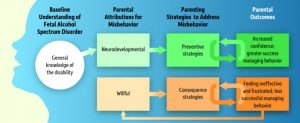
A new study sheds light on how parents and caregivers of children with fetal alcohol spectrum disorders (FASD) can best help their kids, while maintaining peace at home and at school.
“Children with FASD often have significant behavior problems due to neurological damage,” says Christie Petrenko, a research psychologist at the University of Rochester’s Mt. Hope Family Center.
Petrenko and her colleagues found that parents of children with FASD who attribute their child’s misbehavior to their underlying disabilities—rather than to willful disobedience—tend to use pre-emptive strategies designed to help prevent undesirable behaviors. These strategies are likely to be more effective than incentive-based strategies, such as the use of consequences for misbehavior, given the brain damage associated with FASD.
5 misconceptions about fetal alcohol spectrum disorder
The study included 31 parents and caregivers of children with FASD ages four through eight. Petrenko and her team analyzed data from standardized questionnaires and qualitative interviews that focused on parenting practices.
Petrenko says that the study, which appears in Research in Developmental Disabilities, shows that educating families and caregivers about the disorder is critical.
People with FASD often have problems with executive functioning, which includes skills such as impulse control and task planning, information processing, emotion regulation, and social and adaptive skills. As a result, they are at high risk for school disruptions and trouble with the law.
Parents who use pre-emptive strategies “change the environment in a way that fits their child’s needs better,” says Petrenko. “They give one-step instructions rather than three-steps because their child has working memory issues. They may buy clothes with soft seams if their child has sensory issues, or post stop signs to cue the child to not open the door. All of these preventive strategies help reduce the demands of the environment on the child.”

The study also shows that parenting practices correlate with levels of caregiver confidence and frustration. Families of children with FASD frequently face judgment and blame for their children’s misbehavior.
Parents and caregivers who are successful in preventing unwanted behaviors have higher confidence in their parenting and lower levels of frustration with their children than parents who counter unwanted behaviors with consequences after the fact.
Funding came from the National Institute on Alcohol Abuse and Alcoholism.
Posted by Monique Patenaude-U. Rochester November 22nd, 2016 at www.futurity.org
Source: University of Rochester
Original Study DOI: 10.1016/j.ridd.2016.09.005









